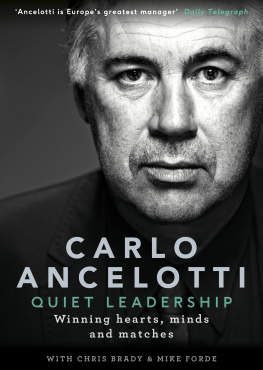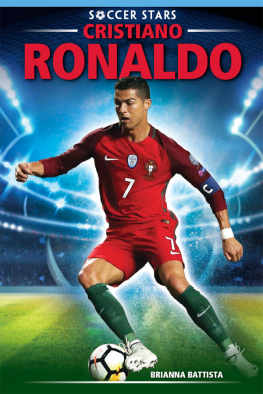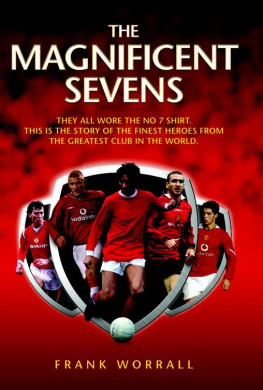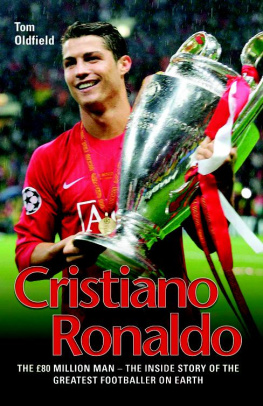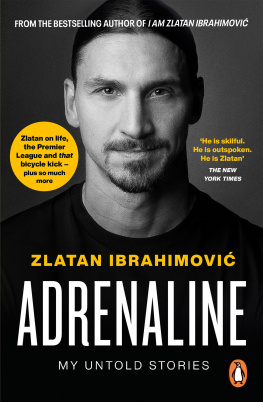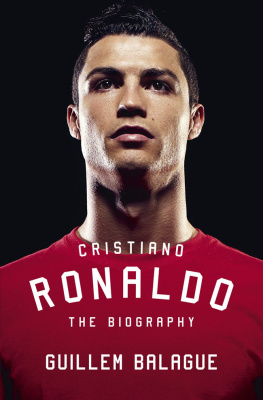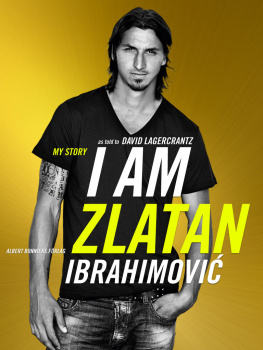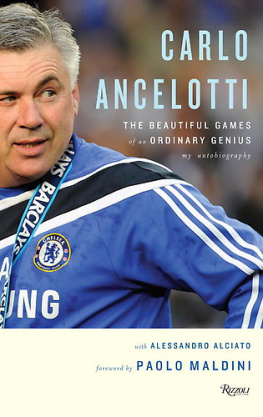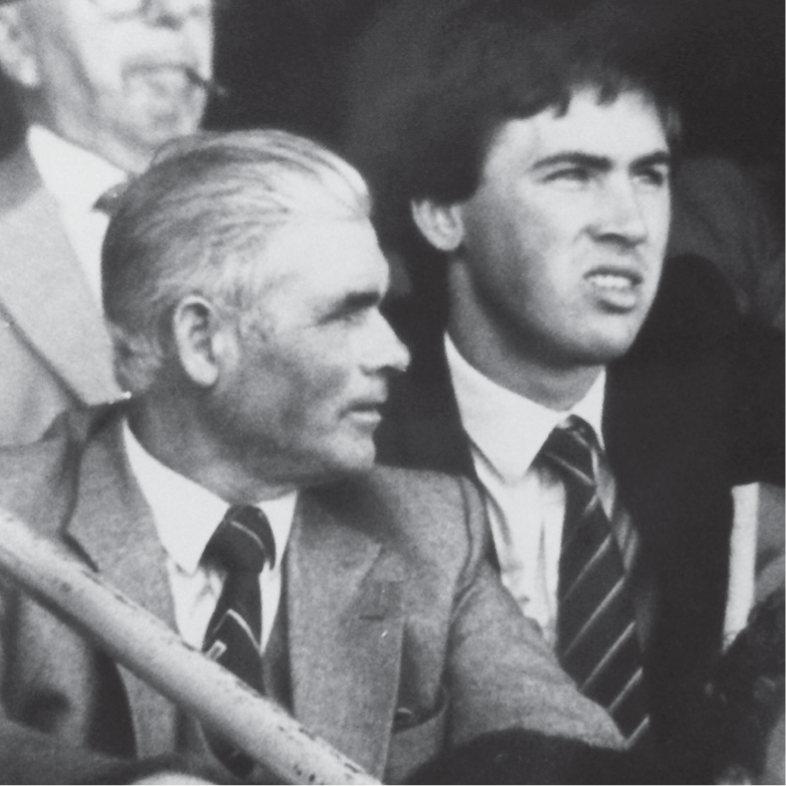Contents
Carlo Ancelotti
QUIET LEADERSHIP
Winning hearts, minds and matches
WITH CHRIS BRADY
AND MIKE FORDE
PORTFOLIO PENGUIN
UK | USA | Canada | Ireland | Australia
India | New Zealand | South Africa
Portfolio Penguin is part of the Penguin Random House group of companies whose addresses can be found at global.penguinrandomhouse.com.
First published 2016
Copyright Axiomatix Ltd, 2016
Front cover photo Levon Biss/Contour by Getty Images
The moral right of the author has been asserted
ISBN: 978-0-241-97538-1
THE BEGINNING
Let the conversation begin...
Follow the Penguin Twitter.com@penguinUKbooks
Keep up-to-date with all our stories YouTube.com/penguinbooks
Pin Penguin Books to your Pinterest
Like Penguin Books on Facebook.com/penguinbooks
Listen to Penguin at SoundCloud.com/penguin-books
Find out more about the author and
discover more stories like this at Penguin.co.uk
Giuseppe and Carlo Ancelotti, Stadio Comunale, Turin 1985
Carlo Ancelotti
In loving memory of my first great leader, my father, Giuseppe
Chris Brady
For my wife, Anita, and my favourite daughter,
Eleanor, because I love them both
Mike Forde
To my father who taught me the responsibility that goes with leading others; to my mother who showed me how to create an environment for people to be inspired and comfortable to be themselves and to my wife, Daniela, who unconditionally supports me daily to be the best version of me I can be.
Introduction
Chris Brady
This book took several years to pull together, mostly because the three of us Carlo Ancelotti, Mike Forde and I wanted it to be a genuinely collaborative piece of work. We started out by defining what we didnt want the book to become. It wouldnt be a standard autobiography, it wouldnt be aimed primarily at a football audience, it wouldnt be an academic business book and it certainly wouldnt be a kiss-and-tell.
We agreed we wanted it to be a book of which we could all be proud. A book that would appeal to a business and a sports audience either involved in, fascinated by or aspiring to leadership roles in the broadest sense. We wanted it to be honest, original, compelling and worthy of discussion and dissent by a curious readership. It isnt a series of stories, though, of course, they are important; instead it is a book based primarily on the reflections of an expert practitioner in leading talented teams in one of the most competitive markets imaginable.
We have set out to reveal Carlo Ancelottis fundamental principles and leadership journey, his core business and skills, his formative experiences, how he learned to lead, and the Ancelotti brand how he sees himself and is perceived by others. We are aiming to get to the heart of how hes continually developed, dealt with setbacks and delivered repeatedly on the biggest possible stage.
With our business and sports leadership backgrounds, we have used this opportunity to hold up the generic theories of experts and academics to intense scrutiny, comparing them unflinchingly to Ancelottis direct experience. As the professional landscape changes radically across all sectors and markets, business leaders have to be better armed to deal with managing diverse and highly talented and often problematic workforces. Using the backdrop of elite sport, we will draw out the leadership insights and lessons of one of the greatest talent managers in the world. We will investigate and challenge strongly held beliefs around how you should lead and manage the best people around you.
Naturally, the central voice is Carlos, as is the grammar. The narrative of the book is told directly by him the result of more than fifty hours of in-depth interviews we conducted with him around the world, focusing on how his experiences illuminated critical business issues both current and timeless. The lessons are implicit in his reflections, but for ease of reference we have included summaries at the end of each chapter explaining the main points of the Quiet Way.
We wanted this to be a book simultaneously by Ancelotti and about Ancelotti, so we have also included interviews with those who know his leadership qualities best. You know what they say: if you really want to know who you are, you have to learn what people say about you when you leave the room. We asked Carlos teammates, colleagues, opponents and, perhaps most importantly, those who have played for him to talk about him behind his back. Players interviewed include Cristiano Ronaldo, David Beckham, Zlatan Ibrahimovi and John Terry, all of whom have also played for other giants of football management, the likes of Pep Guardiola, Jos Mourinho and Sir Alex Ferguson. Ferguson also features as an opponent and his colleagues include Adriano Galliani, the CEO of AC Milan, who, in one role or another, was Ancelottis boss for around thirteen years when Ancelotti was either a player or a coach.
It is testament to the strength of the bonds that Ancelotti makes, and the impact he has had on these elite names, that they all freely gave their time to talk about him. Indeed, they were so keen and so lyrical and passionate once they got started, that the interviews almost always overran their slots I think Zlatan would still be talking now if, after ninety minutes, I hadnt tentatively prompted him to wrap things up.
*
Why is there a need for yet another book on leadership? It must be the most discussed and written-about topic in management. Blogs, TED talks, books, the media, academic articles its everywhere, and you cant get away from it. Historically, there have been more theories of leadership than you can shake a big stick at. Early theorists even assumed that leadership was directly related to membership of the aristocracy and was, therefore, genetically preordained. This led to the great man theory of leadership, which is still prevalent today and includes such diverse luminaries as Moses, the Dalai Lama, Patton, Crazy Horse, Custer, Martin Luther King, Nelson Mandela, Elizabeth I, Florence Nightingale, Colin Powell and Genghis Khan take your pick or name your own.
Other pivotal ideas have included the trait theory of leadership, which argues that there are certain generic traits which can be identified in all great leaders. By contrast, situational theorists argued that great leaders emerged as a result of place, circumstance and time, or what we lay people might call luck the place where preparation meets opportunity. Others were more interested in the development of the individual within an organization; for example the American psychologist Abraham Maslow emphasized the managers role in supporting subordinates.

